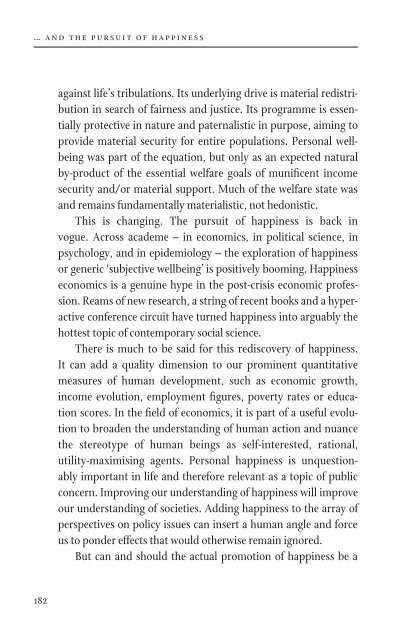… and the Pursuit of Happiness - Institute of Economic Affairs
… and the Pursuit of Happiness - Institute of Economic Affairs
… and the Pursuit of Happiness - Institute of Economic Affairs
You also want an ePaper? Increase the reach of your titles
YUMPU automatically turns print PDFs into web optimized ePapers that Google loves.
<strong>…</strong> <strong>and</strong> <strong>the</strong> pursuit <strong>of</strong> happiness<br />
<strong>the</strong> unbearable lightness <strong>of</strong> happiness policy<br />
against life’s tribulations. Its underlying drive is material redistribution<br />
in search <strong>of</strong> fairness <strong>and</strong> justice. Its programme is essentially<br />
protective in nature <strong>and</strong> paternalistic in purpose, aiming to<br />
provide material security for entire populations. Personal wellbeing<br />
was part <strong>of</strong> <strong>the</strong> equation, but only as an expected natural<br />
by-product <strong>of</strong> <strong>the</strong> essential welfare goals <strong>of</strong> munificent income<br />
security <strong>and</strong>/or material support. Much <strong>of</strong> <strong>the</strong> welfare state was<br />
<strong>and</strong> remains fundamentally materialistic, not hedonistic.<br />
This is changing. The pursuit <strong>of</strong> happiness is back in<br />
vogue. Across academe – in economics, in political science, in<br />
psychology, <strong>and</strong> in epidemiology – <strong>the</strong> exploration <strong>of</strong> happiness<br />
or generic ‘subjective wellbeing’ is positively booming. <strong>Happiness</strong><br />
economics is a genuine hype in <strong>the</strong> post-crisis economic pr<strong>of</strong>ession.<br />
Reams <strong>of</strong> new research, a string <strong>of</strong> recent books <strong>and</strong> a hyperactive<br />
conference circuit have turned happiness into arguably <strong>the</strong><br />
hottest topic <strong>of</strong> contemporary social science.<br />
There is much to be said for this rediscovery <strong>of</strong> happiness.<br />
It can add a quality dimension to our prominent quantitative<br />
measures <strong>of</strong> human development, such as economic growth,<br />
income evolution, employment figures, poverty rates or education<br />
scores. In <strong>the</strong> field <strong>of</strong> economics, it is part <strong>of</strong> a useful evolution<br />
to broaden <strong>the</strong> underst<strong>and</strong>ing <strong>of</strong> human action <strong>and</strong> nuance<br />
<strong>the</strong> stereotype <strong>of</strong> human beings as self-interested, rational,<br />
utility-maximising agents. Personal happiness is unquestionably<br />
important in life <strong>and</strong> <strong>the</strong>refore relevant as a topic <strong>of</strong> public<br />
concern. Improving our underst<strong>and</strong>ing <strong>of</strong> happiness will improve<br />
our underst<strong>and</strong>ing <strong>of</strong> societies. Adding happiness to <strong>the</strong> array <strong>of</strong><br />
perspectives on policy issues can insert a human angle <strong>and</strong> force<br />
us to ponder effects that would o<strong>the</strong>rwise remain ignored.<br />
But can <strong>and</strong> should <strong>the</strong> actual promotion <strong>of</strong> happiness be a<br />
purpose or subject <strong>of</strong> policymaking as such? Should <strong>the</strong> pursuit<br />
<strong>of</strong> happiness become politics? Some <strong>of</strong> <strong>the</strong> towering figures <strong>of</strong> <strong>the</strong><br />
happiness revival advocate nothing less than a radical happiness<br />
agenda. We are told that ‘We need a revolution in government.<br />
<strong>Happiness</strong> should become <strong>the</strong> goal <strong>of</strong> policy, <strong>and</strong> <strong>the</strong> progress <strong>of</strong><br />
national happiness should be measured <strong>and</strong> analysed’ (Layard,<br />
2005a). <strong>Economic</strong>s should equally be revolutionised <strong>and</strong> become<br />
happynomics: ‘it is – or should be – about personal happiness’<br />
(Frey et al., 2008). The first comprehensive monograph on happiness<br />
politics is now available for use (Bok, 2010). Politicians are<br />
paying attention <strong>and</strong> have entered <strong>the</strong> happiness game. The 27<br />
nations that form <strong>the</strong> European Union <strong>of</strong>ficially plan to move<br />
‘beyond GDP’, seeking to complement economic output with<br />
environmental <strong>and</strong> social indicators, including quality <strong>of</strong> life <strong>and</strong><br />
wellbeing (European Commission, 2009). This pan-European<br />
agenda comes in <strong>the</strong> slipstream <strong>of</strong> a global United Nations initiative<br />
to benchmark overall human development. 2 The Organisation<br />
for <strong>Economic</strong> Co-operation <strong>and</strong> Development (OECD) – <strong>the</strong><br />
major <strong>of</strong>ficial policy body <strong>of</strong> <strong>the</strong> developed world – for its part has<br />
launched a ‘Better Life Initiative’, with <strong>the</strong> purpose <strong>of</strong> comparing<br />
wellbeing across its 34 member-countries. 3<br />
At <strong>the</strong> national level, <strong>the</strong> pursuit <strong>of</strong> happiness is increasingly<br />
entering <strong>the</strong> political mainstream. At <strong>the</strong> request <strong>of</strong> <strong>the</strong> French<br />
president, a high-pr<strong>of</strong>ile crop <strong>of</strong> economists has proposed to<br />
measure economic progress by more than <strong>the</strong> usual growth figure,<br />
adding parameters for sustainability, happiness, <strong>the</strong> quality <strong>of</strong><br />
life <strong>and</strong> <strong>the</strong> environment (Stiglitz et al., 2009). In <strong>the</strong> UK, Prime<br />
Minister Cameron <strong>and</strong> his Conservative Party want to devise<br />
2 www.hdr.undp.org.<br />
3 www.oecdbetterlifeindex.org.<br />
182 183












